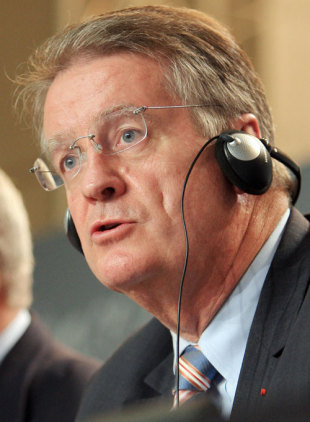|
International Rugby
Argentina edge nearer Four Nations
Scrum.com
May 12, 2010

IRB chairman Bernard Lapasset hailed the latest development as an 'historic milestone'
© Getty Images
Enlarge
Argentina have moved a step closer to taking up a place in an expanded Tri-Nations competition with the news their leading players will be granted release from their clubs to participate in the tournament. The Pumas based with European teams are currently only released for the June and November matches but the International Rugby Board Council have approved a change to Regulation 9 which governs the release of players for international duty that will create a new release period from late August to early October - the proposed dates of the new Four Nations tournament including the Argentina, Australia, New Zealand and South Africa. "Today's announcement represents an historic milestone in the process of Argentina's integration into an expanded Tri Nations tournament and is an extremely exciting development for the Unión Argentina de Rugby and Rugby around the world," said IRB Chairman Bernard Lapasset. "At the Woking Forum in 2007 the global Rugby community made a commitment to prioritise finding an appropriate solution for Argentina's integration into an annual tournament structure. "This Regulatory amendment, coupled with the significant financial assistance of the IRB and SANZAR, represents the global Rugby community's support of this important programme and I would like to thank all parties and in particular SANZAR for their dedication to making Argentina's Four Nations dream a reality. We will continue to work in close collaboration with all stakeholders to make Argentina's transition as smooth as possible," added Lapasset. The decision was also welcomed by former Pumas skipper Agustin Pichot who has led the push for the Pumas' inclusion in a regular international competition as an ambassador for the Argentine Rugby Union (UAR). "This is to the merit of a lot of people, a lot of history written on the pitch and especially in 2007 because it was the catalyst to open this opportunity," Pichot told UAR.com. "There was a lot of hard work for this…I personally feel today that a struggle of many years has been closed, today we're part of the world, as we deserved." His sentiments were echoed by Pumas coach Santiago Phelan who added, "What a great challenge to play against the best teams and players in the world. We're going to have to continue preparing to improve constantly. The Tri-Nations is the toughest tournament in the world, physically and tactically. We have to get to 2012 in the best shape possible and we're on it since our great objective today is the 2011 World Cup." SANZAR, the umbrella body representing the South Africa, New Zealand and Australia also hailed the latest development and vowed to work with the UAR to create greater opportunities for Argentinean players to play in Super Rugby. "This is an exciting step for SANZAR and for world rugby, as it confirms Argentina's participation in a top-flight rugby competition, which they thoroughly deserve, and will add a dynamic new element to the current Tri Nations, which is already regarded as one of the world's toughest tournaments," said SANZAR and New Zealand Rugby Union CEO Steve Tew. "We now need to finalise a participation agreement with the UAR so we can move to full planning for the introduction of Argentina in 2012." In September 2009 SANZAR issued a conditional invitation to the Pumas in an expanded Four Nations competition from 2012. Another key condition was met when the IRB announced in March 2010 that it would provide an initial US$10 million funding package to support the transition programme to substantially underwrite the Pumas' entry into an expanded competition up to 2015. The contribution is in addition to the substantial multi-million dollar investment being made by SANZAR to facilitate the inclusion of Argentina in the Four Nations. The changes to Regulation 9 will be communicated to all relevant stakeholders and will come into effect from June 1, 2012. SANZAR will now work with the UAR to finalise a participation agreement in order to move to full planning for the Pumas' introduction. About IRB Regulation 9:
Northern Hemisphere release period (no change)
Southern Hemisphere release period (no change)
June Global Release Period (no change)
November Global Release Period (no change)
Designated Release Period (no change)
New Four Nations Release Period
New Cross Hemisphere Player Release
© Scrum.com
|
Live Sports
Communication error please reload the page.
-
Football
-
Cricket
-
Rugby
-
- Days
- Hrs
- Mins
- Secs
F1 - Abu Dhabi GP
Abu Dhabi Grand Prix December 11-131. Max Verstappen ()
2. Valtteri Bottas (Mercedes)
3. Lewis Hamilton (Mercedes)
4. Alexander Albon ()
5. Lando Norris ()
6. Carlos Sainz Jr ()
-
ESPNOtherLive >>
Snooker - China Open
Tennis - Miami Open

